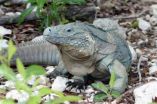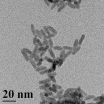(Press-News.org) While thousands of species are threatened with extinction around the globe, efforts to save the Grand Cayman blue iguana represent a rarity in conservation: a chance for complete recovery, according to health experts from the Wildlife Conservation Society's Bronx Zoo and other members of the Blue Iguana Recovery Program.
Coordinated by the National Trust for the Cayman Islands, the Blue Iguana Recovery Program—a consortium of local and international partners—has successfully released more than 500 captive-bred reptiles since the initiative's inception in 2002, when the wild population of iguanas numbered less than two dozen.
"For the past several years, we've succeeded in adding hundreds of animals to the wild population, all of which receive a health screening before release," said Dr. Paul Calle, Director of Zoological Health for WCS's Bronx Zoo.
Fred Burton, Director of the Blue Iguana Recovery Program, said: "We expect to reach our goal of 1,000 iguanas in managed protected areas in the wild in a few years. After that, we will monitor the iguanas to make sure they are reproducing in the numbers needed to maintain the wild population. If we get positive results, we will have succeeded."
The Grand Cayman blue iguana is the largest native species of its namesake island, growing to more than 5 feet in length and sometimes weighing more than 25 pounds. The iguana formerly ranged over most of the island's coastal areas and the dry shrub lands of the interior before becoming endangered by a combination of habitat destruction, car-related mortality, and predation by introduced dogs and cats. The entire island's wild population in 2002 was estimated at only 10-25 individuals.
Recovery efforts to save the Grand Cayman blue iguana have mostly centered on the Salina Reserve, a 625-acre nature reserve located on the eastern side of the island. After being hatched and raised for a year or two in a captive breeding facility, each iguana receives a complete health assessment before release. This involves veterinarians taking blood and fecal samples for analysis, as well as weighing and tagging each reptile. The samples are analyzed in a nearby lab at the St. Matthews Veterinary School while sampling continues. The iguanas are released after the lab results are reviewed and health is verified. This year, the recovery program is releasing iguanas into a new protected area, the Colliers Wilderness Reserve, established last year and managed by the National Trust.
INFORMATION:
Grand Cayman blue iguana: Back from the brink of extinction
Wildlife Conservation Society's Bronx Zoo and other members of the Blue Iguana Recovery Program close to saving reptile on Grand Cayman
2011-07-19
ELSE PRESS RELEASES FROM THIS DATE:
Preschool-age kids in different countries improve academically using self-regulation game
2011-07-19
Children who regularly participated in a Simon Says-type game designed to improve self-regulation – called the Head-Toes-Knees-Shoulders task – may have better math and early literacy scores.
The study found that the higher academic outcomes associated with the game, which emphasizes careful listening and following instructions, does not just benefit students in the United States, but also benefits children tested in Taiwan, China and South Korea.
More than 800 preschool age children ages 3-6 years old in the four countries participated in the study, which was just ...
IADR/AADR publish study on use of Twitter for public health surveillance of dental pain
2011-07-19
Alexandria, VA, USA – The microblogging service Twitter is a new means for the public to communicate health concerns and could afford health care professionals new ways to communicate with patients. With the growing ubiquity of user-generated online content via social networking Web sites such as Twitter, it is clear we are experiencing a revolution in communication and information sharing. In a study titled "Public Health Surveillance of Dental Pain via Twitter," published in the Journal of Dental Research—the official publication of the International and American Associations ...
Solar Panels Keep Buildings Cool
2011-07-19
Those solar panels on top of your roof aren't just providing clean power; they are cooling your house, or your workplace, too, according to a team of researchers led by Jan Kleissl, a professor of environmental engineering at the UC San Diego Jacobs School of Engineering.
In a study in an upcoming issue of the journal Solar Energy, Kleissl and his team published what they believe are the first peer-reviewed measurements of the cooling benefits provided by solar photovoltaic panels. Using thermal imaging, researchers determined that during the day, a building's ceiling ...
New grant supports Hastings work on ethics of medical research with animals
2011-07-19
(Garrison, NY) The Esther A. and Joseph Klingenstein Fund awarded The Hastings Center a $159,000 grant to explore the ethical, scientific, and legal issues on using animals in medical research and on the prospects for using alternatives to animal models.
The project comes at a time when arguments about animal experimentation are changing in fundamental and profound ways. Scientific journals and some biomedical researchers are calling for increased public engagement and education about animal research. The longstanding view that one is either pro-medical progress or pro-animal ...
8-question survey can help predict post-traumatic stress disorder
2011-07-19
A simple eight-question survey administered soon after injury can help predict which of the 30 million Americans seeking hospital treatment for injuries each year may develop depression or post-traumatic stress, report Therese S. Richmond, PhD, CRNP, associate professor at the University of Pennsylvania School of Nursing, and her colleagues in General Hospital Psychiatry.
"Depression and PTSD exert a significant, independent, and persistent effect on general health, work status, somatic symptoms, adjustment to illness, and function after injury," the authors wrote, also ...
Chloroquine finding may lead to treatments for arthritis, cancer and other diseases
2011-07-19
In a study published recently in the journal Science Signaling Van Andel Research Institute (VARI) scientists demonstrate on the molecular level how the anti-malaria drug chloroquine represses inflammation, which may provide a blueprint for new strategies for treating inflammation and a multitude of autoimmune diseases such as arthritis, multiple sclerosis, and certain cancers.
Chloroquine is a widely used anti-malaria drug that inhibits the growth of parasites. For decades, chloroquine and its derivative amodiaquine have also been used as anti-inflammation drugs to treat ...
MadCap Software Raises the Bar on 30-Day Trial Software by Adding Free Gold Level Telephone Support
2011-07-19
Business users take advantage of trial software so they can understand exactly what they are purchasing, but they still have to buy support plans on blind faith. One company is changing that. MadCap Software, Inc. (http://www.madcapsoftware.com), the leader in multi-channel content authoring and a showcase company for Microsoft (NASDAQ: MSFT) Visual Studio and Microsoft XPS, today announced that every 30-day free trial version of its technical communications software now also comes with a 30-day free trial of MadCap's Gold Level technical support. Gold Level support during ...
Rapid venom evolution in pit vipers may be defensive
2011-07-19
Research published recently in PLoS One delivers new insight about rapid toxin evolution in venomous snakes: pitvipers such as rattlesnakes may be engaged in an arms race with opossums, a group of snake-eating American marsupials. Although some mammals have long been known to eat venomous snakes, this fact has not been factored into previous explanations for the rapid evolution of snake venom. Instead, snake venom is usually seen as a feeding, or trophic, adaptation. But new molecular research on snake-eating opossums by researchers affiliated with the American Museum of ...
Cadmium selenide quantum dots degrade in soil, releasing their toxic guts, study finds
2011-07-19
BUFFALO, N.Y. -- Quantum dots made from cadmium and selenium degrade in soil, unleashing toxic cadmium and selenium ions into their surroundings, a University at Buffalo study has found.
The research, accepted for publication in the journal Environmental Science and Technology, demonstrates the importance of learning more about how quantum dots -- and other nanomaterials -- interact with the environment after disposal, said Diana Aga, the chemistry professor who led the study.
Quantum dots are semiconductor nanocrystals with diameters of about 2 to 100 nanometers. ...
Attorney Howard H. Collens of Galloway and Collens, PLLC Speaks at Institute for Paralegal Education Training Seminar
2011-07-19
Howard H. Collens, attorney at the probate and estate planning law firm of Galloway and Collens, PLLC, spoke at a professional training seminar on The Probate Process From Start to Finish for Paralegals, sponsored by the Institute for Paralegal Education (IPE).
The seminar, which took place on June 7, 2011, aimed to increase the understanding and effectiveness of paralegals, legal assistants and legal secretaries during the legal process which may be required after a person dies. Howard H. Collens spoke about topics related to the probate process including the ethical ...
LAST 30 PRESS RELEASES:
A biological material that becomes stronger when wet could replace plastics
Glacial feast: Seals caught closer to glaciers had fuller stomachs
Get the picture? High-tech, low-cost lens focuses on global consumer markets
Antimicrobial resistance in foodborne bacteria remains a public health concern in Europe
Safer batteries for storing energy at massive scale
How can you rescue a “kidnapped” robot? A new AI system helps the robot regain its sense of location in dynamic, ever-changing environments
Brainwaves of mothers and children synchronize when playing together – even in an acquired language
A holiday to better recovery
Cal Poly’s fifth Climate Solutions Now conference to take place Feb. 23-27
Mask-wearing during COVID-19 linked to reduced air pollution–triggered heart attack risk in Japan
Achieving cross-coupling reactions of fatty amide reduction radicals via iridium-photorelay catalysis and other strategies
Shorter may be sweeter: Study finds 15-second health ads can curb junk food cravings
Family relationships identified in Stone Age graves on Gotland
Effectiveness of exercise to ease osteoarthritis symptoms likely minimal and transient
Cost of copper must rise double to meet basic copper needs
A gel for wounds that won’t heal
Iron, carbon, and the art of toxic cleanup
Organic soil amendments work together to help sandy soils hold water longer, study finds
Hidden carbon in mangrove soils may play a larger role in climate regulation than previously thought
Weight-loss wonder pills prompt scrutiny of key ingredient
Nonprofit leader Diane Dodge to receive 2026 Penn Nursing Renfield Foundation Award for Global Women’s Health
Maternal smoking during pregnancy may be linked to higher blood pressure in children, NIH study finds
New Lund model aims to shorten the path to life-saving cell and gene therapies
Researchers create ultra-stretchable, liquid-repellent materials via laser ablation
Combining AI with OCT shows potential for detecting lipid-rich plaques in coronary arteries
SeaCast revolutionizes Mediterranean Sea forecasting with AI-powered speed and accuracy
JMIR Publications’ JMIR Bioinformatics and Biotechnology invites submissions on Bridging Data, AI, and Innovation to Transform Health
Honey bees navigate more precisely than previously thought
Air pollution may directly contribute to Alzheimer’s disease
Study finds early imaging after pediatric UTIs may do more harm than good
[Press-News.org] Grand Cayman blue iguana: Back from the brink of extinctionWildlife Conservation Society's Bronx Zoo and other members of the Blue Iguana Recovery Program close to saving reptile on Grand Cayman



